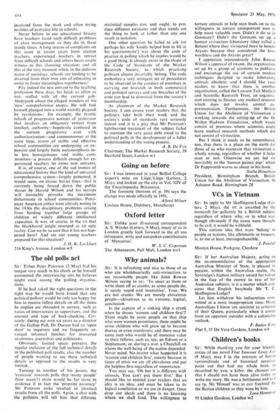The old polls act
Sir: Either Peter Paterson (2 May) had his tongue very much in his cheek or he himself committed the interviewing sins he believes might exist among the polling organisa- tions.
If he had asked the right questions in the right way he would have found that any political pollster would be only too happy for him to receive fullest details on all the items he implies are shrouded in secrecy, such as ratios of interviewers to supervisors, and the amount and type of back-checking. Cer- tainly, during my own six years as a director of the Gallup Poll, Dr Durant had an 'open door' to inquirers and we frequently ar- ranged informal lunches for interested academics, journalists and politicians.
Obviously, limited space prevents the regular inclusion of the full technical details in the published poll results, also the number of people wanting to see these technical details as opposed to the results is very limited.
Turning to another of his points, the 'cynicism' towards polls that 'many people' (how many?) show would be far more in evidence if in fact the 'pinpoint accuracy' Mr Paterson seeks resulted in identical results from all the polls. Again, a chat with the pollsters will tell him that different statistical samples can, and ought, to pro- duce different estimates and that trends are the thing to look at rather than any one result in isolation.
One other question he failed to ask (or perhaps his wife 'kindly helped him to fill in his questionnaire') was about the code of practice in polling which he implies would be a good thing. It already exists in the shape of the Code of Standards of the Market Research Society, to which practising pollsters almost invariably belong. The code embodies a very stringent set of procedures to be observed in the conduct of members in carrying out research in both commercial and political surveys and any breaches of the code can lead to dismissal from the society's membership.
As chairman of the Market Research Society, I can assure your readers that the pollsters take both their work and the society's code of standards very seriously indeed and it is a pity that Mr Paterson's lighthearted treatment of the subject failed to mention the very great debt owed to the political polls in the development of a fuller understanding of the voting process.
A. B. De Vos Chairman, The Market Research Society, 39 Hertford Street, London wl


































 Previous page
Previous page